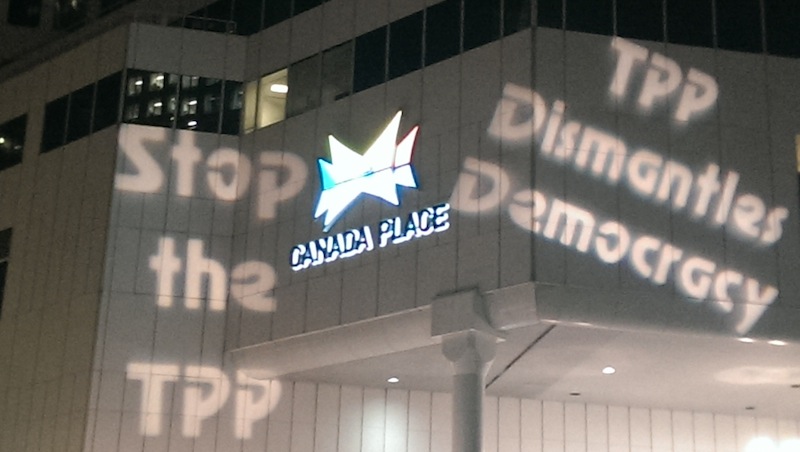Please support our coverage of democratic movements and become a supporting member of rabble.ca.
Over the weekend, North American trade justice activists searched the city of Vancouver for a so-called “interessional” meeting of investment negotiators from Trans-Pacific Partnership countries. We only learned about the meeting late last week via Peruvian media. A press release on Sunday by the TPPxBorder network stated correctly (at the time) that the Harper government had not told anyone — public or media — that any TPP negotiation was happening.
That changed late Sunday with the following (hardly) enlightening statement from International Trade Minister Ed Fast:
“As a government committed to opening new markets to increase Canadian exports to fast-growing regions around the world, we are proud to be playing an active role in negotiating an ambitious TPP agreement that advances Canadian interests and brings jobs, growth and prosperity to all TPP countries. I am pleased to report that the sessions held in Vancouver have helped move these important negotiations forward.”
And we’re pleased to announce that while U.S. and Vancouver activists didn’t find the TPP intersessional, they took the cross-border organizing against this next generation corporate rights deal to the next level.
Activists from the Washington and Oregon Fair Trade Coalitions, as well as Occupy Bellingham and the Backbone Campaign, who gathered in Bellingham this weekend for a TPP Action Camp, snapped into action when we all found out about the TPP meeting in Vancouver. They headed for the border, participated in an emergency TPP teach-in co-organized by Greenpeace in Vancouver on Saturday night, then hit the town to light up the night sky with messages against the Trans-Pacific Partnership.
On Sunday, the same groups protested the TPP outside the offices of Pacific Rim — a Canadian mining company that is suing El Salvador for $300 million under international investment rules that say corporate profits should be protected from community opposition to mining. The Pacific Rim case epitomizes everything that is wrong with investment treaties and investment chapters in corporate rights deals like the TPP — and why it was important to protest the intersessional TPP meeting in Vancouver.
The cross-border action took place just one week after the Hupacasath First Nation of Vancouver Island argued in a Vancouver federal court that the investment protections in the Canada-China Foreign Investment Protection and Promotion Agreement (FIPA) interfere with First Nations governance, and that the Harper government violated its constitutional responsibility to consult with First Nations on international treaties that impact Indigenous and treaty rights.
If the federal judge agrees, it could force a significant democratization or opening up of Canada’s pro-corporate investment treaty making process. That would naturally affect the TPP and Canada-EU negotiations, which both include FIPA-like “protections” for corporations and investors that are more important, more enforceable under trade and investment deals, than most other real rights you can mention.
The TPPxBorder network, to which the Council of Canadians, Common Frontiers and other Canadian organizations are members, is committed to increasing its cross-border efforts to stop the TPP. The Vancouver interessional could be a taste of what’s to come — a possible full TPP negotiating round in Vancouver in the last week of August and first week of September, according to rumours. In between now and then there is another full round in Malaysia in mid-July.
We have our work cut out for us but the Vancouver actions this weekend are a sign that the movement against corporate rights deals of all stripes — and the Harper trade agenda — is growing.



